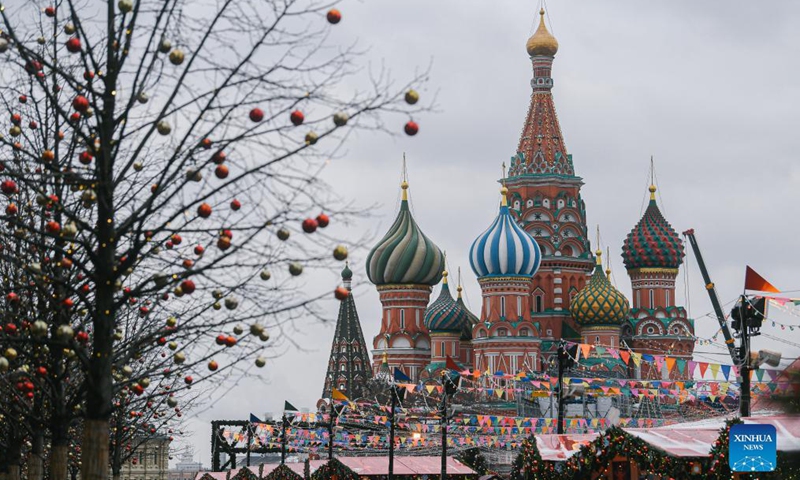
Photo taken on December 3, 2021 shows Saint Basil's Cathedral in Moscow, Russia. Photo:Xinhua
Since tensions started to escalate on the Russia-Ukraine border and the warmongering media hype in the US intensified, many journalists, observers and officials around the world were keen to hear about China's stance on the unfolding security crisis in Europe. On Tuesday, Chinese officials presented China's position, calling on all parties to exercise restraint and resolve differences through dialogue and negotiation.
However, tensions continue to escalate, as the US and an increasing number of its allies, have announced an array of economic sanctions against Russia over Moscow's move to officially recognize "the Lugansk People's Republic (LPR)" and "the Donetsk People's Republic (DPR)" as independent and sovereign states.
Following earlier sanctions against the two regions, US President Joe Biden on Tuesday announced new measures targeting Russian banks and restricting Russia's access to financial markets. Many US allies, including Canada, Australia and Japan, have also announced various sanctions against Russia. Meanwhile, Biden has threatened more crippling sanctions "if Russia goes further with this invasion."
While some in the US appear to be claiming victory over what US officials and media outlets describe as "swift and severe" actions against Russia, those sanctions also affect others, potentially including businesses and consumers in the US and its allies, even if the cost is not evident immediately.
China is also certainly not a fan of economic sanctions and on Wednesday, a spokesperson of the Chinese Foreign Ministry made that very clear.
At a regular press briefing in Beijing, Hua Chunying, spokesperson of the Ministry of Foreign Affairs, expressed China's consistent opposition to all "illegal unilateral sanctions." The Chinese government's position, she said, is that imposing sanctions has never been a fundamental and effective way to solve problems.
Hua did not stop there. She went on to quote some figures regarding US sanctions over the past two decades. US sanctions in the past 20 years increased tenfold with 3,800 sanctions imposed by the previous administration alone. The US imposed sanctions against Russia over 100 times since 2011, according to Hua.
"Have the US sanctions solved the problem? Has the world changed for the better because of US sanctions? Will the Ukraine issue be resolved naturally because of US sanctions against Russia? Will Europe become more secure because of US sanctions against Russia?" Hua asked.
Her remarks on the economic sanctions against Russia may very well be among the most elaborate and most straightforward public statements on the Ukraine situation from Chinese officials. The length, tone and intensity of the comments left no doubt about China's disdain for illegal unilateral sanctions.
There are several crucial factors behind this. Although many Western media outlets often describe the sanctions by the US and its allies against Russia as a response from the international community. However, these actions are actually illegal and unilateral under international rules. They have not been approved by the UN, and the countries that have imposed them, regardless of how powerful they are, do not represent the entire international community. As a responsible permanent member of the UN Security Council, China will not support such "illegal and unilateral" sanctions.
Another crucial point is that the dire consequences of the sanctions, intended or not, have been paid by Russia and many other countries and global industries. If US officials were to follow through what they have threatened so far, basically all foreign businesses dealing with Russia could be targeted, including Chinese companies. In addition, business ties between China and Russia are vast. In 2021, trade between China and Russia rose 35.9 percent year-on-year to $146.87 billion, reaching the highest level in history, according to data from China's Ministry of Commerce. So, in terms of economic interests, China also needs to stand on guard against what could potentially undermine its national interests.
"The US must not harm the legitimate rights and interests of China and other parties when handling the Ukraine issue and its relations with Russia," Hua said at the briefing on Wednesday.




